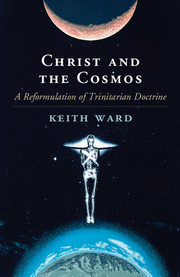Book contents
- Frontmatter
- Contents
- Preface
- Acknowledgements
- PART I THE THREEFOLD NATURE OF THE DIVINE BEING
- PART II THE BIBLICAL SOURCES OF TRINITARIAN THOUGHT
- 6 Three Centres of Consciousness?
- 7 The Synoptic Gospels
- 8 John's Gospel
- 9 The Trinity in the Epistles
- 10 The Idea of Incarnation
- PART III THE TRINITY, IMMANENT AND ECONOMIC
- PART IV THE SOCIAL TRINITY
- PART V THE COSMIC TRINITY
- Bibliography
- Subject Index
- Name Index
7 - The Synoptic Gospels
from PART II - THE BIBLICAL SOURCES OF TRINITARIAN THOUGHT
Published online by Cambridge University Press: 05 September 2015
- Frontmatter
- Contents
- Preface
- Acknowledgements
- PART I THE THREEFOLD NATURE OF THE DIVINE BEING
- PART II THE BIBLICAL SOURCES OF TRINITARIAN THOUGHT
- 6 Three Centres of Consciousness?
- 7 The Synoptic Gospels
- 8 John's Gospel
- 9 The Trinity in the Epistles
- 10 The Idea of Incarnation
- PART III THE TRINITY, IMMANENT AND ECONOMIC
- PART IV THE SOCIAL TRINITY
- PART V THE COSMIC TRINITY
- Bibliography
- Subject Index
- Name Index
Summary
I will begin my discussion of the Biblical texts with the Gospels. Although they are to be dated later than most of the Letters in the New Testament, they are the only records we have of the life and teachings of Jesus. As such, they have special importance in the search to understand the relation between Jesus, God the Father, and the Spirit of God. Do the Synoptic Gospels really imply that God, Jesus, and the Spirit are three centres of consciousness? New Testament scholars would be very wary of reading later Christian doctrines or perspectives back into the Scriptural texts, and they are much more likely to stress the great diversity of views that exists in the texts, as well as the relatively undeveloped character of those views.
There would be agreement that early Christian communities were committed to the worship of one creator God. Those communities found that in relating to the risen and glorified Jesus, they were in some way relating to God. And they believed that God was present within and among them as the Spirit of Jesus. It was this experience of a threefold manifestation of God that was to lead to the development of Trinitarian thought. But there is not much agreement about what exactly might be said of the historical Jesus and his precise relation to the creator God.
Though the Gospels refer to him as ‘son of God’, Jesus, as he is depicted in the Gospels, does not usually refer to himself as ‘Son of God’. He more often refers to himself as ‘Son of Man’. This expression, Bar Nasha in Aramaic, means, as Geza Vermes points out, the son of a human, and so a human person. Jesus was certainly believed to be a unique human being in many ways. He has authority to forgive sins, to exorcise evil spirits, and to control wind and sea. His life is a fulfilment of prophecies that he will be rejected, will suffer, and will die as a ‘ransom formany’ (Mark 10, 45). He was raised from death and will appear in ‘the glory of his Father with the holy angels’ (Mark 8, 38). This situation certainly puts this human in a very close relation to the Father and distinguishes Jesus from all other human persons.
- Type
- Chapter
- Information
- Christ and the CosmosA Reformulation of Trinitarian Doctrine, pp. 43 - 51Publisher: Cambridge University PressPrint publication year: 2015



